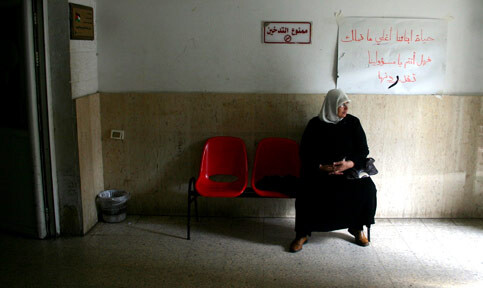The Electronic Intifada 14 June 2007

A Palestinian woman waits inside the emergency room in Ramallah Governmental Hospital, as Palestinian health sector employees agreed to a partial return to work following a deal to give them part of their salaries during strikes that crippled the Palestinian health care sector, 19 November 2006. (Fadi Arouri/MaanImages)
BRUSSELS, Jun 13 (IPS) - The European Union’s freeze on direct aid to the Palestinian Authority has led to sharp increases in debts owed by families in the West Bank and Gaza, the relief agency Oxfam has alleged.
Next week (Jun 18), the EU’s foreign ministers are to discuss the security situation in the Middle East, with particular focus on the recent clashes between the rival Palestinian organisations Fatah and Hamas. Oxfam is calling on the Union’s 27 governments to use the occasion to reverse their 2006 decision to suspend direct aid to the Palestinian Authority after Hamas swept to victory in parliamentary elections.
According to a survey conducted by Oxfam of 2,500 households in the Palestinian territories, one out of every 15 families has ran up a debt exceeding 25,000 dollars — nearly three times the annual salary of a teacher. Some 68 percent of families in Gaza and 53 percent in the West Bank have reported that their debts — typically for water, electricity and food — have risen in the past year.
Oxfam attributes the debt hike in part to the EU’s decision to cease giving aid to Palestinian institutions. Although the Union has re-routed its aid through a Temporary International Mechanism (TIM) proposed by the European Commission, this has had a severe impact on the payment of salaries to over 160,000 public sector employees. Wages have either been paid late or not been paid at all in the case of some police and security staff.
Michael Bailey, an Oxfam spokesman on humanitarian affairs, said that the boycott of a Hamas-led government by the EU, United States, United Nations and Russia has resulted in a two-third drop in the Palestinian Authority’s income and has contributed to doubling the number of people living on less than 50 cents a day to more than a million. Whereas the Authority previously had a 1.5 billion dollar annual budget, this has now shrunk to 500 million dollars.
Bailey said that the EU would be correct to stop aid if it was being siphoned off to finance terrorist attacks. But, he said, the British government and others have confirmed there is no evidence that this had been occurring.
Oxfam alleges that the EU decision has indirectly provided political support for Israel’s refusal to block transfer of the customs and tax revenues it collects on behalf of the Palestinian Authority. Israel has withheld 700 million dollars in such revenues from the Palestinians, a decision which Bailey called “arguably illegal.”
Betty Hunter from the Palestine Solidarity Campaign in Britain said the EU’s decision is hampering the possibility that an effective peace process could be developed.
“We are ashamed of the European Union for not lifting the siege of the Palestinian people,” she told IPS. “The deliberate policy of trying to bring down an elected government is responsible for the political impasse. It is helping to fuel the conflict.”
Although the EU is the leading donor to the Palestinians and a key trading partner with Israel, it has lacked unity over the past year on how the Middle East should be tackled.
Some of the Union’s member states, such as France, Spain, Sweden and Ireland, have been pushing for a resumption of direct aid but others, particularly the Netherlands, have insisted that the boycott should continue.
A leaked report by the UN’s envoy to the Middle East, Alvaro de Soto, has vigorously condemned the boycott, describing it as “at best extremely short-sighted”.
The aid freeze was undertaken after an international ‘quartet’ designed to provide the basis of a solution to the Middle East conflict called on Hamas to commit to non-violence and to recognise Israel. According to de Soto, the quartet — comprising the EU, the U.S., the UN and Russia — had set “unattainable conditions for dialogue” and was “all but imposing sanctions on a freely-elected government.”
A representative of the Palestinian Authority in Brussels described the EU boycott as “scandalous and negative.”
But an Israeli diplomat defended the boycott and urged that it be maintained, pointing out that Hamas features on a list of proscribed organisations drawn up by EU officials.
“Perhaps Oxfam doesn’t know that Hamas is on the EU terror list,” the diplomat told IPS. “It professes terrorism, carries out terrorist acts and is not willing to recognise the state of Israel. We are not against supporting the Palestinian people as such. But transferring money to a Hamas-led government would be suicidal.”
Nonetheless, Oxfam has pointed out that the Palestinian Authority operates over 1,600 schools and 400 hospitals and health centers. The latter are suffering from severe shortages of essential medicines as a result of the aid cuts, it says.
It also argues that the shortfall in funding is hampering efforts to create a durable solution to the Middle East conflict by ensuring that both Israel and Palestine enjoy statehood.
“You can’t run a government if two-thirds of its income is taken away,” said Bailey. “And if you talk to ordinary Palestinians, you will find considerable resentment over why the EU should have sided so readily with the hardline policies of Israel and the U.S.”
Christiane Hohmann, the European Commission’s spokeswoman on external relations, said Wednesday that while her institution was calling on rival factions in Gaza to refrain from further violence, the fighting did not appear to be having an impact on the Temporary International Mechanism. “As far as I know, we haven’t had any problems with the TIM and disbursements through the TIM,” she added.
All rights reserved, IPS – Inter Press Service (2007). Total or partial publication, retransmission or sale forbidden.
Related Links



